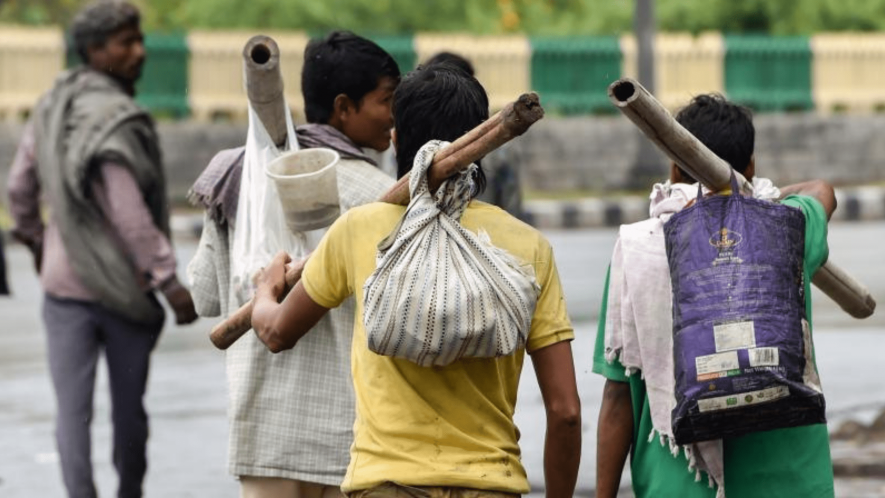Why India Should not Send Workers to Israel

Representational Image. Image Courtesy: PTI
Israel’s economy is facing an acute shortage of labour due to the ongoing war in key sectors, one of which is the construction sector. Ever since the conflict began on October 7, around 90,000 work permits of Palestinian workers, who constitute around 25% of the human resources in the construction sector, have been revoked by the Israeli state. The shortage of workers has led to a significant slowdown in construction activity, bringing the country’s construction sector to operate at only 15% of its pre-war capacity.
According to a report published by VOA news on November 1, in response to this labour crisis, the Israel Builders’ Association, represented by its vice-president Haim Feiglin, has urged the Benjamin Netanyahu government to consider hiring around 1,00,000 Indian workers as a replacement for the Palestinian workforce.
Israel previously signed an agreement with India to facilitate temporary employment of Indian workers in specific labour market sectors, including the construction sector. During Israeli Foreign Minister Eli Cohen’s visit to India on May 9, the “Framework Agreement on Facilitating Temporary Employment of Workers in Specific Labor Market Sectors in Israel” was signed.
This agreement initially allowed the employment of 42,000 Indian workers in Israel. According to this, 34,000 workers will be engaged in the construction field and another 8,000 for nursing needs. This move was widely seen as an opening for the Indian workers, who had traditionally been primarily employed as caregivers, to the construction sector of Israel.
Brutal Treatment of Palestinian Workers
Numerous human rights organisations have, for decades, reported the brutal and inhumane treatment of workers in Israel’s detention camps. Recently, thousands of detainees were released from these camps. Their testimonies reveal unspeakable horrors they had to endure in these camps, including physical and psychological torture.
Administrative detention, under which people are detained or arrested without charges or trial by the state or authorities, is one of the major methods Israel uses against Palestinians to maintain the apartheid system. Workers have accused the Israeli military of stripping them naked, confining them in cages and beating them brutally with batons and metal sticks. Some said they were subjected to electric shocks in detention. The torture methods included purposefully starving the workers and denying them basic necessities.
According to the workers’ testimonies, Israeli authorities confiscated their phones and money, leaving them isolated from their families. They were given meagre food rations, which were placed on the floor in plastic bags, which worsened their suffering.
The situation prompted six human rights organisations in Israel to file a petition with the country’s High Court, challenging the legality of these detentions. The petition argues that the workers were held without proper legal authority and grounds, pointing to the dire conditions and extensive physical violence and psychological abuse within the facilities.
What aggravates the situation is that none of the workers were aware of their own whereabouts during their entire detention. This denial of information naturally added to their sense of vulnerability and fear.
Another dehumanizing act of the Israeli authorities was the number tags they attached to the ankles or wrists of the workers in their detention camps. Numbering the workers, akin to how animals are treated, reminds of the horrific tattoo numbers the Nazis tattooed on inmates in concentration camps.
Don’t Use Indian Workers to aid Ongoing Genocide
Sending Indian workers to replace the Palestinian workers whose work permits were revoked by the Israeli authorities poses multiple issues on political as well as moral grounds.
The primary concern is the safety and security of the Indian workers abroad. Israel is officially at war and India has been evacuating hundreds of citizens from the war zone. Sending Indian workers, who come mainly from underprivileged backgrounds, to work on Israeli construction sites, would jeopardise their safety and security. It would be an exploitation of their dire living conditions in India.
Additionally, the nature of the jobs they might get in Israel are very ambiguous. The present demand for Indian workers is a result of the extraordinary conditions of war and the revocation of the work permit of Palestinian workers. There is no clarity on whether the jobs offered to Indian workers are of permanent or long-term nature. Once the war is over, what will happen to these workers is also unclear. This makes the recruitment of workers in wartime even more exploitative.
There is a high chance that the Indian workers will be removed from their roles once the peace is restored. So, why should the lives of our workers be gambled with for the benefit of a state at war?
It is very evident that the workers from Palestine were subjected to inhumane treatment by Israel’s authorities. The history of violence by Israel’s authorities over the past seven decades shows that these are not isolated incidents of torture against a particular people, but a part of the systemic violence of its apartheid policies.
There is no guarantee that Indian workers will not be subjected to similar treatment by these authorities. Despite the newly-formed romance between India’s right-wing and their Israeli counterparts, as being demonstrated on social media and other platforms, the disgust of Zionists toward people in the subcontinent, especially on the grounds of “idolatry”, the racist allegations related to lack of cleanliness etc., have also become noticeably clear.
Since Israel as a state never adheres to human rights standards, nor is it ready to accept the stipulations of international law, the possible ill-treatment of our workers is a grave concern.
The Construction Workers Federation of India, affiliated with the Centre of Indian Trade Unions, has strongly opposed any plan to send Indian workers to replace Palestinians in Israel’s attacks!
A much wider political and moral question is involved here—that is about the position India should take in the ongoing developments. Over the last four weeks, Israel has unleashed massive violence with a genocidal tendency against the people of Gaza.
The death toll has already crossed ten thousand. The war efforts of Israel nakedly violate all international humanitarian law by targeting civilian populations and infrastructure. The inhumane treatment of workers from Palestine is just the latest episode of this horror story, and yet Israel has shown no interest in most of the world’s calls for a ceasefire.
In such circumstances, sending workers to revive the economy of a state that is conducting the worst war crimes of this century, in effect, aids that country’s war. This act will be condemned for selfishly benefitting from the miseries of the poor workers of Palestine. If it happens, it would be a black mark on India’s seven decades of principles-based diplomatic positions, as an anti-colonial state, on the statehood of Palestine. The right thing would be for India to call for a ceasefire and ensure humanitarian aid to the people of Gaza.
The author is assistant professor, St Joseph’s College of Law, Bengaluru. The views expressed are personal.
Get the latest reports & analysis with people's perspective on Protests, movements & deep analytical videos, discussions of the current affairs in your Telegram app. Subscribe to NewsClick's Telegram channel & get Real-Time updates on stories, as they get published on our website.
























